
 |
|
|
#21 |
|
Member
Join Date: Dec 2008
Location: So. Orange County
Posts: 302
|

|
|
|

|
|
|
#22 |
|
Senior Member
Join Date: Feb 2010
Location: Clairemont
Posts: 813
|
|
|
|

|
|
|
#23 |
|
Senior Member
Join Date: Sep 2005
Posts: 1,922
|
Here's mine. Through hull, ala Bing!
Had it in a year now. Not a single drop of water. No drag. No maintenance. I can read bottom in over 500 ft, track small jigs all the way down, and have an accurate surface temp. Went a little heavy on the 5200, but it offers me a good peace of mind. Sorry for the bad photo's 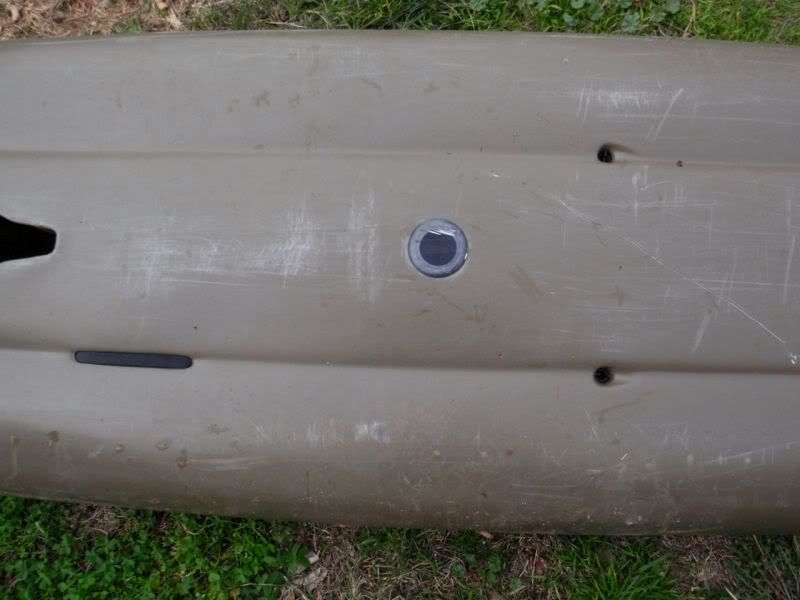 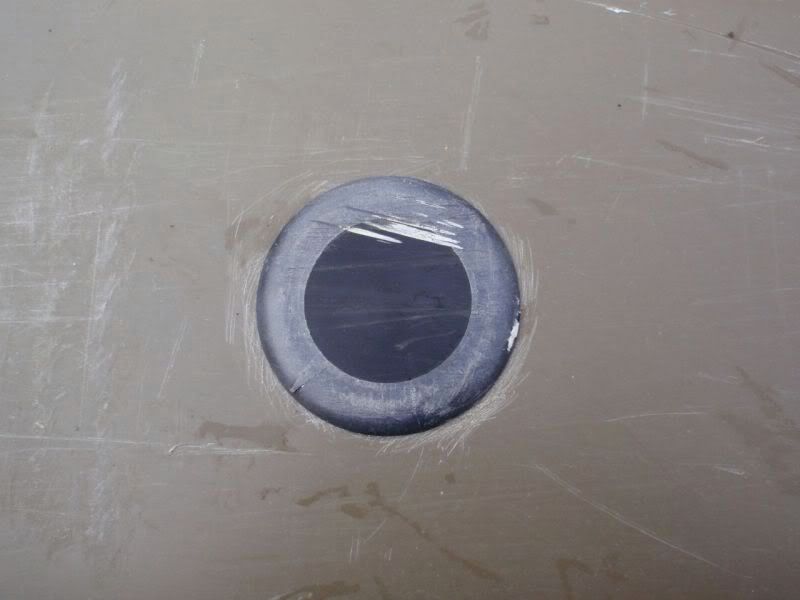 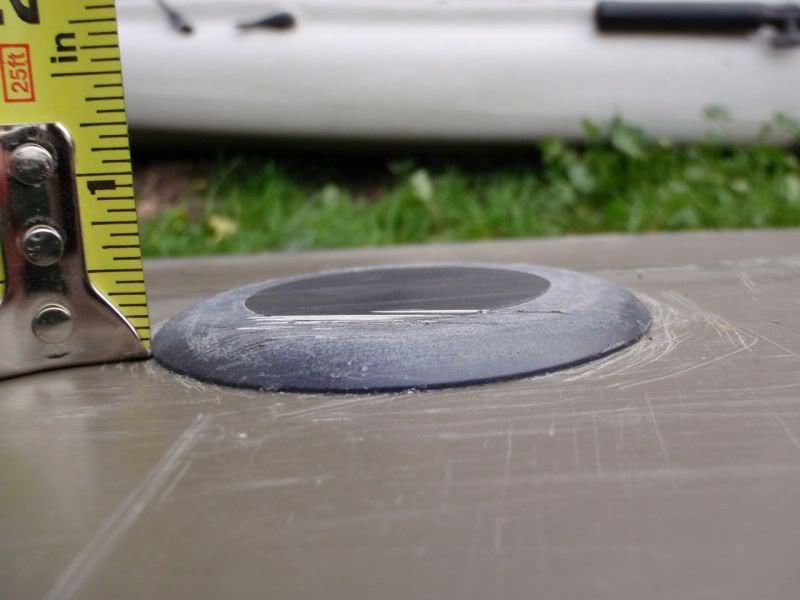 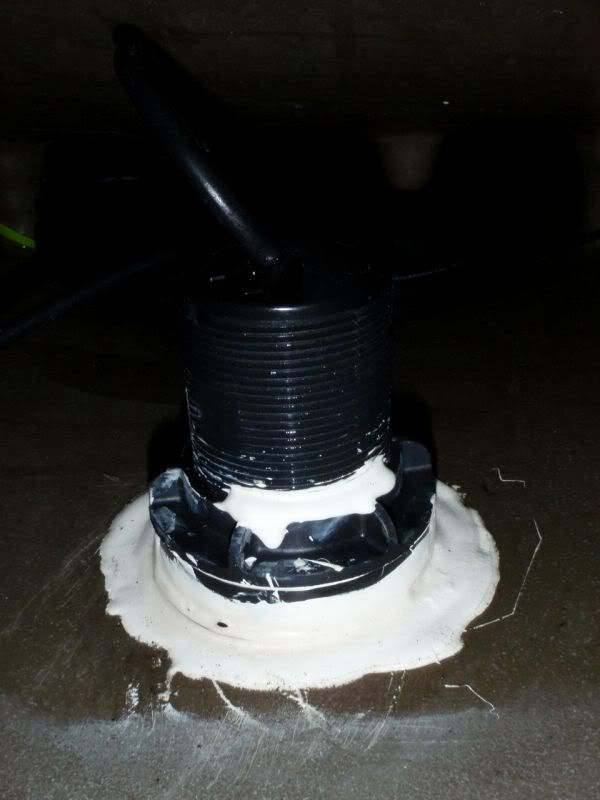 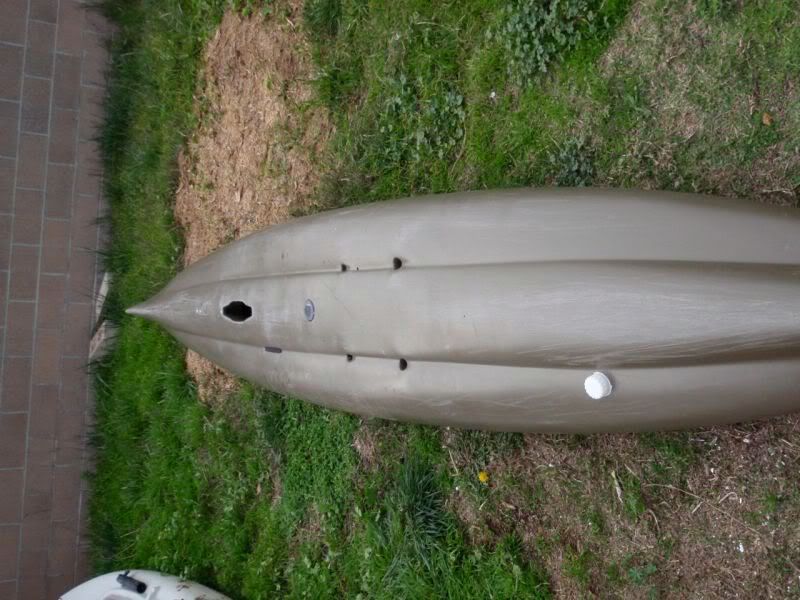
|
|
|

|
|
|
#24 |
|
Member
Join Date: Feb 2008
Location: Carlsbad
Posts: 80
|
I also did the thru hull and don't have any leaks either. I used just enough 5200 to bond it to the kayak and make it waterproof. If done correctly, it's not going to just come apart and sink your kayak.
I trimmed off the excess 5200 once it was fully cured. (after this photo was taken)   I am not trying to encourage anyone to do this. I just wanted to verify, from my own experience, that this can be done without compromising safety. Jason |
|
|

|
|
|
#25 | |
|
.......
Join Date: Jan 2009
Posts: 1,509
|
Quote:
Transom mounted transducers are relatively new in comparison and of limited use compared to through hulls, do to the fact they are pretty much relegated to small craft.. I got my idea for building my set up from an older 56 ocean sportfisher I captained. When we put it in dry dock to install a Furuno searchlight sonar (18 grand) I got the chance to pull out several old transducers out that were originally glassed right into the hull. They were working but we still replaced them with new state of the art, industry standard bronze thru-hull transducers that look and function almost exactly like the one you put in your kayak. Your average big boat has maybe a dozen thru hulls in it, drains, intakes, as well as transducers. They only time the fail is when they are over tightened or stripped or when elctrolisys takes out a bronze thru-hull. I've never heard of a transducer thru-hull leaking or failing on a large boat, and considering the fact they have a much deeper water line and more water pressure on the seal, I'd say it's extremely unlikely you would ever have a leak using a traditional threaded thru-hull like the one you put in your kayak. I mean realistic you're talking a water depth of inches, and using units that are designed to seal against water pressure caused by many feet of water. The wet well transducers may work much better then the gooped ones, but a properly mounted thru hull transducer has even better performance the a transom mount transducer properly hung down in the water on the back of a transom of a boat, and the threaded ones are even easier to install. When installed in the hull of a yak they actually give the exact same performance, as they do in a high end boat, so it's simply the best method of installation performance wise ..period. I mean it all depends what you want. Possibly having a thru-hull in you yak may lower the resale value, but for me the performance is worth it. Personally I'm more worried about catching fish now then what I can sell my yak for later down the line....  .... and I'd say there is no safety issues with thru-hull transducers (especially like yours) at all. When I saw Bing post his, I figured the cat was out of the bag, and that there would be a bunch of people following suit and switching over, as a threaded thru-hull is a simple install that anyone can do. I think down the road it's going to be the standard procedure as to how kayak guys rig their transducers. Im surprised that one of the manufacturers has not made a inset for them to keep them level when placed to the side to keep then from getting scratched up. Personally I don't like seeing them on the center line where the get dragged on the sand, but I imagine you will see something like an 1/4 inch inset for them down the line. Since airmar makes the vast majority of them for pretty much all the brands the smaller plastic thru-hull transducers are pretty much all the same size wise, so essentially once the hole is drilled they are interchangeable. Bottom line... Properly installed they will never be an issue, and the will outperform anything out there. Jim Last edited by Fiskadoro; 02-25-2010 at 02:44 AM. |
|
|
|

|
|
|
#26 |
|
Senior Member
Join Date: Sep 2006
Location: Bay Ho
Posts: 1,382
|
That 3M 5200 sealant is excellent for through hull fittings.
|
|
|

|
|
|
#27 | |
|
Senior Member
Join Date: Jul 2006
Location: Fullerton
Posts: 1,361
|
Quote:
BUT the difference between the way it was gooped in before and how it is now, there is no comparison. I had to turn down the sensitivity some. Don't get me wrong, I'm not trying to convince you. But the rationale behind it being safe convinced me. With the aluminum plate tightened down against the neoprene you have a compression seal. Then you have the 5200, which after doing this I am convinced is nasty to work with but in-freaking-credible stuff! When my daughter (age 4) grows up & starts dating  I just may have to use this on the boy's britches to make sure they stay on I just may have to use this on the boy's britches to make sure they stay on   . That and the nail gun . That and the nail gun But I digress. After the initial run and seeing how dry it is inside, and considering the double seal involved I would absolutely take this approach again. But I digress. After the initial run and seeing how dry it is inside, and considering the double seal involved I would absolutely take this approach again.
|
|
|
|

|
|
|
#28 |
|
.......
Join Date: Jan 2009
Posts: 1,509
|
5200 was designed specifically for use with Marine thru- hulls. It's the standard of the industry and everyone uses it.
It is tough stuff. I once had to use a 2 ton jack to push out a 4 inch intake thru-hull (bronze) that was 5200'd in place and it still was not easy to get out. Shipyards commonly heat up large bronze through hulls with torches to compromise the 5200, other wise they are almost impossible to remove. It used to be very expensive, over twenty bucks a tube, now it's come down do to the fact that non-marine stores like home depot carry it. Actually for yaks a prefer the black version of 4200 which dries faster then 5200, both are more the adequate for sealing plastic threaded thru-hulls in kayaks. Jim |
|
|

|
|
|
#29 | |
|
.......
Join Date: Jan 2009
Posts: 1,509
|
Quote:
My concern and the reason I did not push the idea that much as there would be people who'd try it without the knowledge or skill to pull it off. With the flush mount foam and plate method you are creating your seal using the interactive properties of three separate materials. We're making the seal rather then just installing one, which means there is a greater possibility of screwwing up. If you know what your doing it's fool proof but it's not fool proof if you don't know what you are doing...  . .With the thru-hull you already have the seal all you have to do is drill the right sized hole in the right place, stick it in with minimal sealent and tighten then tighten the nut to an appropriate tension. Add 5200 and anyone could do it, as it's parctiacally a no brainer. It's no more difficult or complicated then installing a intake for a bait tank. I'd recomend that route to anyone, but the method you and I used is more complcated and takes a set of skills to exicute correctly...so I'm a little more cautious on recomending that one. That said each has it's pros and cons. Our setup creates less darg and it's less likely that our transducers will get significant damaged or scratching since they are flush with the hull. Additionally our transducers were cheaper as they came stock with the units. So it's less expensive to do but more labor intensive to do right. In contrast the thru-hull is less labor intensive, so it's more accessbale to the average guy and in that one you don't have to reinvent the wheel as your using that transducer in exactly the manner it is designed to be used. May take is there's more then one way to skin the catfish. That each has it's merits. I got two seprate yak projects I'm playing with right now, off and on: one in metal and one in Kevlar carbon composite. I'll probably use both methods, using a thru hull for the tin yak, and a built in for the KC yak, but nothing is written in stone at this point. Jim |
|
|
|

|
|
|
#30 | |
|
Member
Join Date: Feb 2008
Location: Carlsbad
Posts: 80
|
Quote:
My Garmin 440s did not come with a transducer. Knowing that it would give the best performance possible, I decided to get the thru-hull. And yes, the threaded style that I have is pretty fool-proof.  Jason |
|
|
|

|
|
|
#31 | |
|
.......
Join Date: Jan 2009
Posts: 1,509
|
Quote:
I just bought one off ebay a new 440s for $330 "new in box". Here's the funny part. It was missing the transducer!! So I contacted the seller and he credited me a 50 buck refund. What's funny is I already had bought a $150 buck airmar threaded thru-hull transducer (they make the Garmins and it's Garmin compatible) for fifty bucks off ebay. So I got the unit brand new in the box for $330, with a threaded thru hull transducer...  The only disappointment for me is that it will not fit on any of my older yak setups for my 398C due to the fact they have a changed the connector for the cord. Jim |
|
|
|

|
|
|
#32 |
|
Member
Join Date: Feb 2008
Location: Carlsbad
Posts: 80
|
|
|
|

|
|
|
#33 |
|
Senior Member
Join Date: Nov 2007
Location: Canyon Country, Ca.
Posts: 116
|
BTW Re: wet mount I was at Camping World recently and in their sewer hook up parts they had clear plastic fittings. they might be large enough for transducers.....H

__________________
mellow yellow malibu eXtreme |
|
|

|
|
|
#34 |
|
Junior
Join Date: Feb 2007
Location: Bay Ho
Posts: 5
|
Nice install Jim. Thru hull is the way to go just be sure to use the fast cure 5200 (which you can also get in white). The regular stuff can take a month to cure. My only question is why you did not use SS counter sunk bolts with SS fender washers and nylock nuts on top instead of screws? Not that I think you would have any issues with screws but curious what went into that decision. I have built and rigged many skiffs and was just wondering. My yak is old school with no FF since I don't use it very often.
Good 5200 story, I had to torch and sledge hammer out my last bronze transducer which I used 5200 to install (it failed) in my boat. I have drilled 7 thru holes in my boat and none leak. I once had to use a forklift to get an engine bracket off a boat that was adhered only with 5200 (bolts removed)! |
|
|

|
|
|
#35 |
|
Senior Member
Join Date: Aug 2008
Location: Long Beach
Posts: 427
|
Garmin Transducers
I just purchased a new Garmin FF. Does anyone know if they or any dealer will exchange the transome mount ducer for a thru-hull type?
|
|
|

|
|
|
#36 |
|
Administrator
Join Date: Mar 2005
Location: 1-2 miles off the point
Posts: 6,948
|
Com'on F/F is useless without one of these
 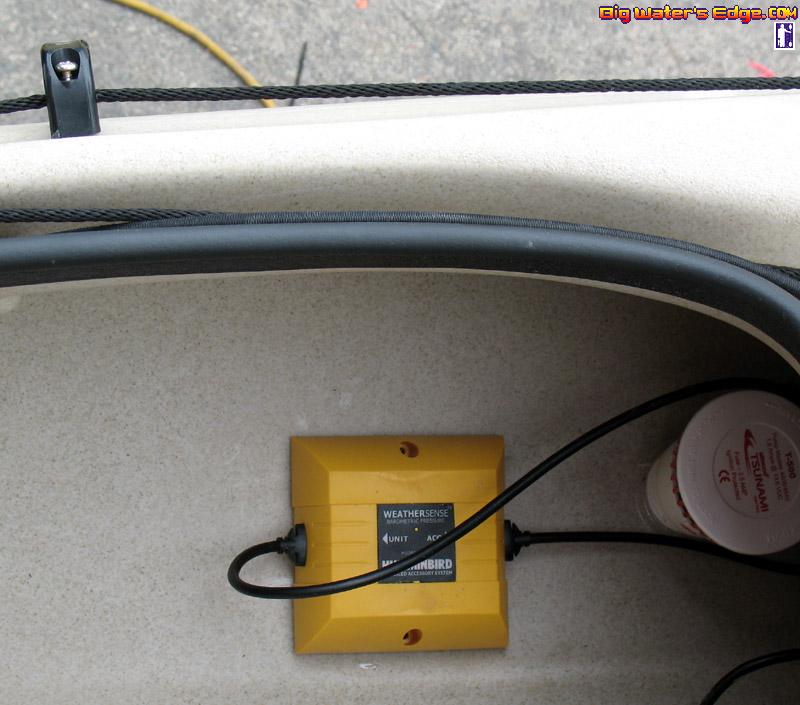
__________________
 
|
|
|

|
|
|
#37 |
|
bing!
Join Date: Mar 2007
Location: socal
Posts: 246
|
Dang Iceman! Why'd you have to take it up a notch
 BAM! I want one. BAM! I want one.Glad to see me and Jim are not the only ones that jumped off the thru hull cliff  Its not for everone, but I have not regretted it. /bing Last edited by peguinpower; 02-26-2010 at 04:55 PM. |
|
|

|
|
|
#38 |
|
Administrator
Join Date: Mar 2005
Location: 1-2 miles off the point
Posts: 6,948
|
Not my ride Bing, customer wanted F/F moved up to the sail mast. Had to pull the Kayatank and saw the lil yellow box inside.
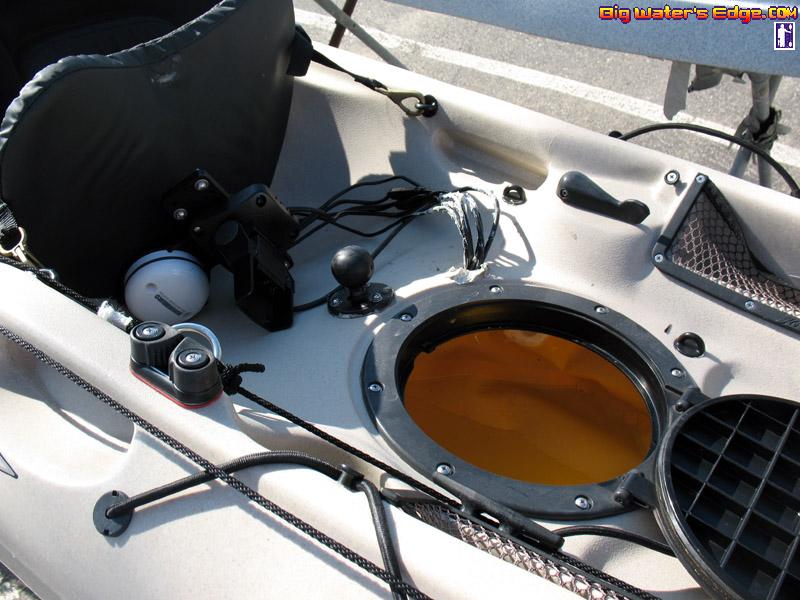
__________________
 
|
|
|

|
|
|
#39 |
|
Senior Member
Join Date: Mar 2008
Posts: 611
|
pardon my lack of inteligence....
but... what is that yellow box and what does it do? |
|
|

|
|
|
#40 | |
|
.......
Join Date: Jan 2009
Posts: 1,509
|
Quote:
The higher the atmospheric pressure the more water it can hold in the air. So usually when you get a dramatic drop in atmospheric pressure your going to get rain. Cold fronts that produce rain are actually low pressure fronts. Water is more dense then air and when the air pressure changes it creates micro changes in water density. For years and years people have said that fish bite on a falling barometer, but the question has always been why. My take is that baitfish do to there small size have trouble dealing with changes of temperature PH or pressure. When you have a dramatic shift in barometric pressure, it can produce a small change in water pressure, which can sometimes disorient bait and make it easy prey. This is the same reason offshore fish feed on temp breaks. Baitfish when they hit a break get disoriented as their bodies adapt to the temp change which makes then easy prey for larger fish that are not effected by the small changes due to their increased mass. Whatever the reason fish tend to feed before storms, and they somehow have a way of sensing storms are coming. I'd say they have some kind of ability to sense the rapid drop in pressure which signals the storms are coming. In a way that box just gives the angler the same ability. Jim |
|
|
|

|
 |
|
|